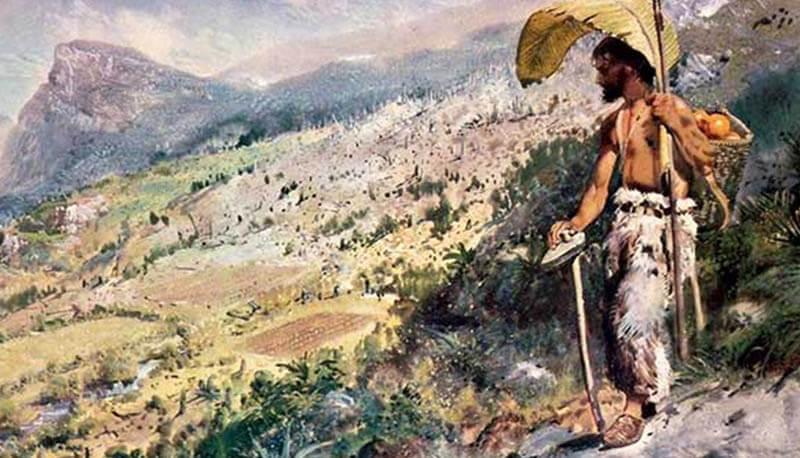Concetti Chiave
- Daniel Defoe, born in London, was a merchant's son who turned to journalism and politics before writing the novel "Robinson Crusoe".
- "Robinson Crusoe" is considered the first modern novel, inspired by the true story of a Scottish seaman shipwrecked on a desert island.
- The novel follows Crusoe's 28-year survival on an island, where he meets a native named Friday and eventually returns to England as a wealthy man.
- Robinson Crusoe embodies European colonial aspirations, as he attempts to impose his culture and beliefs on the native Friday.
- The story reflects economic individualism, showcasing Crusoe's pursuit of wealth and enterprise through trade and self-sufficiency.
Daniel Defoe's early life
Daniel Defoe was born in London. Son of a merchant, he was educated at a school of Dissenters (puritans). He travelled for some years in Europe. Around 1700 Defoe turned to journalism and became particularly interested in politics, writing pamphlets and essays. He wrote in prose, and he published a novel called "Robison Crusoe". He died in 1713 in London.
Robison Crusoe tells of a man's shipwreck on a desert island. The plot is based on the true story of the Scottish seaman Alexander Selkirk. It is generally regarded as the first modern novel.
Crusoe's life on the island
Robison Crusoe is a young man living in England who dreams of going to sea. Crusoe is presented with a new proposition: to being a business in the slave trade. While he is travelling to Africa there is a terrible storm, he is shipwrecked and he is the only survivor. He remains in that island for 28 years. In second part the novel centres around his life on the island and it is written in the form or a journal. 
Crusoe's survival skills
Robison Crusoe is a legendary figure; thanks to his hard work, determination and creative skills, he manages to organize his daily life perfectly. He becomes a hunter, a builder and a shepherd. He battles to survive and wins that battle.
Robison behaves as a colonist even with the native he meets, Friday. He gives a name to the slave, teaches him his language and new techniques and tries to convince him to embrace his religion.
Crusoe's economic motivations
Born into ten England middle class, he expressed the economic and political aspirations of his class. Although Robison has a modest and secure life in England, he leaves in order to improve his financial situation and seek adventure. It is more profitable to trade with the indigenous people of non-western countries because they value goods differently from the Europeans. He turns to the profitable business of the slave trade. Shipwreck on the deserted island he does not lose heart. He recreates the kind of micro-social structure which is as close as possible to the one he left.
Domande da interrogazione
- Chi era Daniel Defoe e quale fu il suo contributo alla letteratura?
- Qual è la trama principale di "Robinson Crusoe"?
- In che modo "Robinson Crusoe" riflette le aspirazioni coloniali europee?
- Come "Robinson Crusoe" rappresenta l'individualismo economico?
Daniel Defoe era un giornalista e scrittore inglese, noto per aver scritto "Robinson Crusoe", considerato il primo romanzo moderno.
"Robinson Crusoe" narra la storia di un uomo naufragato su un'isola deserta, basata sulla vera storia del marinaio scozzese Alexander Selkirk, e racconta la sua sopravvivenza e vita sull'isola per 28 anni.
Robinson si comporta come un colonizzatore con il nativo Venerdì, dandogli un nome, insegnandogli la lingua e cercando di convertirlo alla sua religione, esprimendo così le aspirazioni coloniali europee.
Il romanzo rappresenta l'individualismo economico attraverso la storia di Robinson, che lascia una vita modesta in Inghilterra per migliorare la sua situazione finanziaria e avventurarsi nel commercio, incluso quello degli schiavi.






 Accedi a tutti gli appunti
Accedi a tutti gli appunti
 Tutor AI: studia meglio e in meno tempo
Tutor AI: studia meglio e in meno tempo